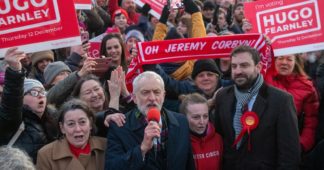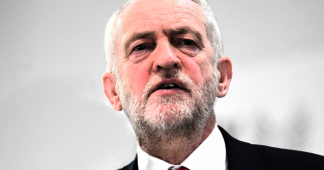His brand of right-wing authoritarianism has abolished the radical tradition embodied by Corbyn
By Peter Oborne
6 October 2023
Labour conference 2024: Newly elected Prime Minister Keir Starmer strides onto the stage.
An ecstatic audience rises to its feet in galvanic applause to celebrate the greatest victory in the history of the Labour Party. Bigger than Clem Attlee’s great victory over Winston Churchill’s Tories in 1945; bigger even than Tony Blair’s famous 179-seat majority in 1997.
Meanwhile, the Tory Party is broken by defeat and poisoned by the battle for the successor to Rishi Sunak.
In theory, the British left ought to celebrate the end of 14 years that – as even many Conservatives accept – have been a disaster for the country. In practice, there is a profound sense of loss.
One of Starmer’s predecessors as Labour leader, Harold Wilson, the winner of four general elections, declared that his party was “a moral crusade or it is nothing”. For Wilson, Labour was a party of two basic factions: the head and the heart.
Thus, Wilson’s Labour government had strong right-wing voices, such as Roy Jenkins and Denis Healey. But they were balanced by left wingers such as Michael Foot and Tony Benn.
The postwar Attlee government had robust right-wing talent, such as the foreign secretary, Ernie Bevin. But he was balanced by left wingers like Aneurin Bevan, founder of the National Health Service.
This meant that the 20th-century Labour Party was at its best a magnificent democratic force capable of appealing to great swathes of British society, from the working classes to professionals. Not so under control freak Starmer, who has abolished this delicate balance.
By-election victory
Starmer’s brand of right-wing authoritarianism has no room for a Foot, Benn or Bevan. He has abolished the battle of ideas, along with the radical tradition of which former Labour leader Jeremy Corbyn was the final embodiment.
I don’t believe that Starmer has thought through the consequences. He will pay a price for driving out the British left.
When he takes power next year – and in the wake of Thursday’s sensational Rutherglen by-election, there can be little doubt of that outcome – the British left will not be represented in parliament.
This has not happened since the party’s first leader, Scottish trade unionist Keir Hardie, was elected MP for West Ham South in 1892 (there’s no way a socialist like Hardie would survive in Starmer’s party). That was more than 130 years ago.
Banned from parliamentary debate, the British left will only be heard on the streets and through strike actions. This is profoundly dangerous for democracy – all the more so at a time when economic forecasters predict a recession and living standards are in sharp decline.
Crucially, there’s a version of this problem on the Tory benches. Just as Starmer has purged the left of the Labour Party, former Prime Minister Boris Johnson purged the left of the Tories.
Back in 2019, the Conservative Party endured the political equivalent of what natural scientists call a mass extinction event, when Johnson drove out the so-called one-nation Tories from the party in order to impose his own version of political uniformity.
Politicians such as former chancellor Ken Clarke, rising star Rory Stewart and many others were forbidden from standing in the 2019 general election. This act of hubris opened the way for entryists from the far right. The party retains its name and legal structure, but as the recent Tory conference in Manchester proved, the party has otherwise changed beyond recognition.
Far-right conspiracies
I have seen the term “fascism” used in connection with this conference. I don’t think that’s quite right. Fascism is associated with militarism, violence and above all, Adolph Hitler and Benito Mussolini, the two dictators who arose in the 1930s.
The term should not, and cannot, be used in relation to Sunak’s Conservatives. But Sunak’s supporters aren’t Conservative in the traditional sense. How should we describe them?
During the conference, they lied, spouted far-right conspiracy theories, dumped climate-change policies, mocked the rule of law, pilloried minorities and generally echoed the language and the politics of former US President Donald Trump.
Racism, as I exposed last week in my article on Home Secretary Suella Braverman’s attack on British Pakistanis, has become an embedded feature of the politics of Britain’s governing party. The Tories under Sunak can be compared to the AfD in Germany or the Trump Republicans.
This is not an accident. Isaac Levido, Sunak’s political strategist, learned his trade at the feet of Lynton Crosby, master of the art of exploiting “wedge issues” for electoral advantage.
Judging by recent events, he’s planning to do exactly the same in next year’s general election. And he’s targeting one group of voters in particular: the far right.
Labour’s challenge
There’s a reason for this. Over the summer months, polls consistently showed a Labour lead over the Tories of between 15 and 20 percent. Such a lead might appear indestructible – until one notes that the populist Reform UK regularly scores up to 10 percent.
Tory strategists crave the support of these hard-right Reform voters, whose support would lift the Conservatives to the mid-thirties in the polls – a base from which to challenge Starmer.
This scares Starmer. I understand why.
A quarter of a century ago, Jenkins described Blair’s task ahead of the 1997 election as “a man carrying a priceless Ming vase across a highly polished floor”.
Hence Starmer’s aversion to risk; his supplication to media giant Rupert Murdoch; his ingratiation with the right-wing vote; his sycophancy to big business; his intolerance of the left; and his refusal to make the moral case for Labour against the hard right.
The consequences when Starmer wins power will include a cowed majority at Westminster for a technocratic Labour government, while real politics gets going elsewhere. On the left, this will occur through extra-parliamentary actions, while on the right, the Conservative Party will mutate into something increasingly dark, horrible, intolerant and dangerous.
So far, Starmer has defined his leadership against the Labour left. His challenge at the Labour conference this coming week is to show that he can also define himself against the Tory right. It really ought not to be too difficult – not against the Sunak rabble.
We remind our readers that publication of articles on our site does not mean that we agree with what is written. Our policy is to publish anything which we consider of interest, so as to assist our readers in forming their opinions. Sometimes we even publish articles with which we totally disagree, since we believe it is important for our readers to be informed on as wide a spectrum of views as possible.











